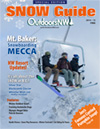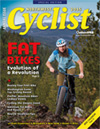Seattle’s Blind Champion: Aaron Scheidies
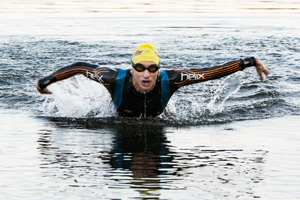
Legally Blind
From following blobs to front of the pack, Aaron Scheidies realizes his ‘normalcy’ and becomes a World-Class Paratriathlete
By Carolyn Price
Photo at right: Seattle’s Aaron Scheidies is an eight-time winner in the U.S. Paratriathlon National Championship. Photo by Stephanie Skeffington, www.seaflashinglights.com
Young Aaron Scheidies didn’t quite understand why he started losing his vision in second grade. People accused him of faking his failing vision, just to get attention. And, he couldn’t play soccer, which he loved.
“I was so young and I didn’t understand what was wrong,” says Scheidies, whose parents took him to nearly every neurologist and psychologist in Michigan where the family lived. “Finally, we went to a doctor who diagnosed me with Juvenile Macular Degeneration or Stargardt’s Disease.”
JMD is a term for an inherited eye disease. Stargardt’s Disease, which affects about one in 10,000 children in the U.S. and causes a lack of central vision, but not a loss of peripheral sight.
“I just wanted to be a normal teenager,” Scheidies remembers. Instead, after the diagnosis, he plunged into depression and was diagnosed with Obsessive Compulsive Disorder as well as an eating disorder. Suicidal thoughts crept into his subconscious.
His life turned around when he was a freshman in high school after his brother suggested he try swimming. He did—and it changed his life.
“Being in the pool relieved me of those pressures of being different,” says Scheidies. He said he finally realized that his sight was the normal for him and that he needed to meet his own potential. “Swimming offered me the opportunity to learn to become resilient and to face new challenges.”
From Following Blobs to Front of the Pack
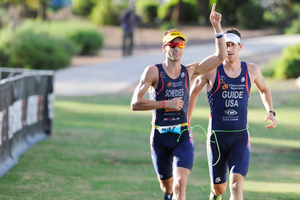
Aaron Scheidies approaches the finish line with his Guide Colin Riley at the USA Paratriathlon National Championships in Tempe, Ariz. last August. Photo by Mario Cantu/CIMAGES, courtesy of USA Triathlon
Even though he was legally blind, Scheidies started racing sprint triathlons. His supportive parents drove him over the racecourses beforehand and told him where all the potholes and turns were. Along with memorizing the directions, Scheidies was also able to utilize the ‘blobs’ of people ahead of him in the race and he would just follow them.
That was well over a dozen years ago. Today, Scheidies, who has lived in Seattle for several years, can no longer rely on the blobs in front of him as he is usually in the front of the pack. He ranks as the world’s top paratriathlete in the PT5 category for visually impaired/blind and has practically rewritten the record books in his classification.
Scheidies has recorded multiple championships in not only the sprint triathlon category but in Ironman Olympic distance, Half Ironman, Marathon and Half Marathon races as well.
This year he won gold medals in the International Triathlon Union’s Paratriathlon World Championship (his fifth) and is the eight-time winner in the U.S. Paratriathlon National Championship. In fact, Scheidies handily won this year’s ITU World’s race in 1:00:58, five minutes ahead of the second-place finisher.
Other accomplishments in his para-categories include: four-time victor in the Ironman 70.3 Para Worlds, three-time Boston Marathon (2:44:32) champion, three-time winner in the USABA (U.S. Association of Blind Athletes) Marathon and two-time winner in the Half Marathon (1:16.25).
He is also the holder of world records as fastest athlete with a disability in the Olympic and Half Ironman distances (1:57.24 and 4:09.54, respectfully).
However, there is only one race left that has eluded him and that is the 2016 Paralympic Summer Games in Rio de Janeiro.
Unfortunately, Scheidies’ PT 5 Men’s Blind/Visually impaired triathlon category was not selected this fall by the International Paralympic Committee as one of the three classifications to compete in the Olympics.
“The road to Rio is a journey, not a destination,” is still the mantra on Scheidies’ blog page. After the IPC decision, he graciously tweeted, “I’m disappointed…and this one definitely hurts…but I will pull it together.”
“I definitely have not ruled out Rio,” says Scheidies. “My Road to Rio is going a different direction. I am being looked at by other Paralympic sports currently.”
No Pity Party
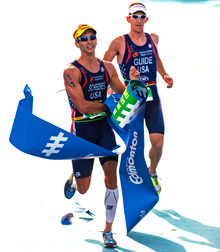
Aaron Scheidies wins by more than two minutes at the 2014 ITU World Paratriathlon Championship in Edmonton, Alberta in the Men’s PT5 Division with Guide Colin Riley. Photo by Rich Cruse Photography, www.crusephoto.com
Scheidies, 32, who graduated with a degree in Physical Therapy from the University of Washington in 2008, currently works at Crista Senior Living facility in Shoreline. Just as he uses his heightened senses when competing, Scheidies says he uses his honed listening and tactile skills to work with his elderly patients.
“I use a lot of feel and am more hands-on than other therapists,” says Scheidies. “Geriatric care is gross broader movements. It’s one of the reasons I went into this area, instead of working with athletes.”
On the racecourse, Scheidies uses these heightened listening and awareness skills as he works in tandem with one of two sighted Guides.
“It’s a team sport (with me) while starting, stopping, turning. We have to have good communication.
“And, with my normal, my mindset, I try to live in the mindset of the able-bodied athletes as if they see what I see. It has conditioned me to work harder and not throw a pity party for myself.”
During the swim portion, Scheidies and his Guide are tethered around their waists where Scheidies can feel tugs on which way to go.
On the tandem, he really does sit in the back—contrary to some illogical questions he has been asked about that—but he is the one who sets the speed and the pace.
On the run the two athletes are tethered with a bungee cord to stay together and as a signal to other athletes not to run between them.
“They’re like my seeing eye dog,” Scheidies says of his two Guides, Ben Collins and Colin Riley, who alternate running the races with him and whose job it is to give him directions and steer him clear of obstacles on the run.
“You want to have a Guide that is better than you,” explains Scheidies. “Ben is one of the top (triathlon) pros in the country and Colin is the top national triathlon amateur and could easily turn pro.”
Sense of Humor Never Lost
High admiration for Scheidies gushes from his Guides.
“Aaron is one of the most optimistic and positive people I’ve ever met,” says Collins, a native of Seattle. “He takes on life’s challenges and just expects everything to work out. If it doesn’t work out, he tries again and embraces the silver lining in every bad experience.
“Aaron does not give up,” adds Collins. “He’s a real competitor and believes he is the best. He’s willing to try hard and he measures himself against the best athletes in the world with vision, ignoring his disability.”
Collins adds that Scheidies’ sense of humor is never lost on his disability.
“When I guided him earlier this year he made me sign a ‘Guide contract,’” says Collins.
“Embedded in the contract were clauses such as ‘Guide agrees not to run Aaron into any walls or other solid objects, regardless of how funny Guide believes it will be to watch; and Guide agrees to take responsibility for everything bad that happens during the ‘Guide Period.’”
Adds Riley: “Aaron is clear on his expectations, and part of that is that he expects to have fun. Even when he’s nervous he never loses his sense of humor. Being his Guide is fun; Aaron is such a great spirit.
“It’s also nerve-racking because I don’t ever want to let him down or be the reason for a poor performance,” says Riley who currently lives in Cincinnati.
With all his successes, it’s easy to imagine what Scheidies’ capabilities would be if he didn’t have just 15 percent vision, and really could see the road ahead of him.
Scheidies, however, is pragmatic.
“I compare my results to able-bodied athletes, it’s a good way to look at it to maximize my potential, instead of being satisfied at where I’m at,” he says.
“I just keep working hard to be the best I can be.”
Carolyn Price is publisher of OutdoorsNW and has finished a dozen able-bodied sprint triathlons.
Follow Aaron Scheidies’ Blog
Scheidies has raised over $50,000 for organizations that help support blind and visually impaired causes. And his C Different with Aaron Movement strives to change society’s perception of the blind and visually impaired community.
Scheidies has spoken at schools across the country to help ease the fears of children with vision disabilities, telling them that they can overcome any challenge and how to maneuver without the help of a cane or seeing eye dog,
Follow Scheidies’ blog, www.cdifferentwithaaron.com

